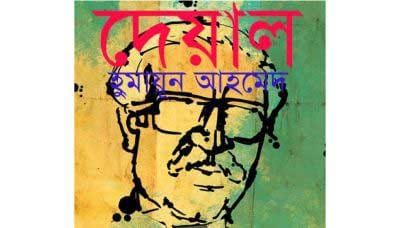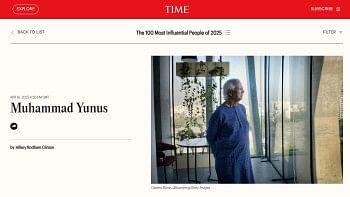A novelist's dilemma

Humay-un Ahm-ed is a popular novelist among Bangla-speaking readers in Bangladesh and elsewhere. At the February 21st book fair at Bangla Academy, Humayun's novels have long been bestsellers. Whenever, at any of the bookstalls of Ekusheyr Boi Mela (21st February's book fair), you come across a long queue of youngsters, you can be sure that it is for the latest novel by Humayun Ahmed that has just been published. Small wonder, over at least the last three decades, his novels have been the hottest item at the book fairs. Especially, readers in their 30s and below are crazy about Humayun's novels.
This popular novelist is now facing a big dilemma. A part of his latest Bangla novel, Deyal, was published in the May 11 issue of the Bangla daily Prothom Alo. Attorney General Mahbubey Alam found a certain para of the story that relates to the killing of little Sheikh Russel, the youngest child of martyred Bangabandhu Sheikh Mujibur Rahman, to be at variance with the facts of the August 15, 1975 tragedy as recorded in the judgement of Bangabandhu murder case.
And to correct facts, as given in the court judgement recorded in the documents, Mr. Alam brought the lines of the story he found controversial to him the notice of the High Court (HC). And the HC in a rule on May 15 asked the authorities concerned to furnish the writer with copies of relevant documents and judgements of the Bangabandhu killing case so that he (Humayun) could present the information in a correct manner in the book.
It is now the task of the authorities concerned to supply the novelist with the facts as ordered by the HC.
It will be Humayun Ahmed's turn now to decide either to defend his narrative as it was written by him, or to change it in keeping with the court judgement and documents.
Leaving the matter to the writer's own discretion, the first question that comes to mind is, being an accomplished and celebrated novelist as he is, was not Humayun aware of the facts as indicated in the court ruling? Or is it that he was not aware, or that he has his own interpretation about the historical facts in question?
It is common knowledge that a writer, especially a fiction writer, enjoys certain degree of freedom about how she/ he would mesh the facts of history with the story she/he would like to narrate.
There is always a state of conflict between the story-teller and the realist in a writer. In the present case the fictionist Humayun Ahmed appears to be in conflict with realist Humayun Ahmed. Of course, the reality we are talking about is the facts of the August 15, 1975's real life tragedy, which is now part of history.
Writers have their own interpretation of history.
Humayun, like every other writer and novelist of consequence, has his own style of taking the drama of his stories to its climax and then draw it to a close. Readers will be waiting with bated breath how Humayun has planned his storyline to unfold basing on a real life tragedy that took place in 1975.
As it has come in the media, the novel, Deyal, has been termed a political one. But since it is also based on history as the tragedy took place within the last four decades history of Bangladesh, it can also be termed a historical novel. Under whatever category we may like to place this latest novel of Humayun Ahmed, the book is neither purely a political, nor a historical one.
Despite its political or historical twist, it would be a novel, pure and simple. Because, from whatever source novelists, playwrights and long or short story writers may gather materials for their work, their ultimate objective is to entertain their writer or make them think with their story. They are story-tellers in the last analysis.
Being a very powerful story-teller in recent Bangla literature, Humayun Ahmed's aim no doubt was to tell a story in Deyal. But the readers will now wait for Humayun's decision about what he would do about a particular section of his narrative where the writer has come in conflict with the version of the history as recorded in the official documents of the court.
It is anybody's guess what the novelist himself is thinking. At this critical juncture of his life, the novelist Humayun Ahmed is torn between a two-dimensional dilemma. One relates to the cancer he is trying to beat, while the other is a moral one.
We think the novelist has the strength and courage to survive both the challenges.

 For all latest news, follow The Daily Star's Google News channel.
For all latest news, follow The Daily Star's Google News channel. 



Comments